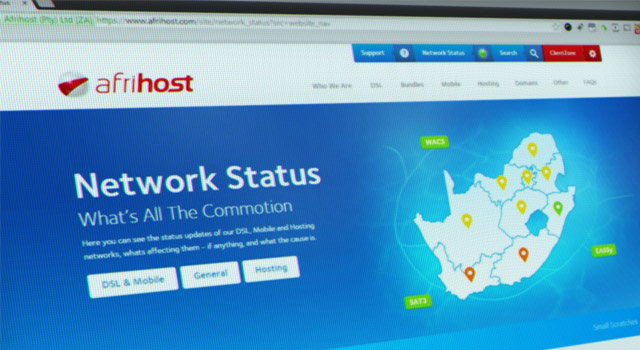
Afrihost subscribers who buy broadband ADSL bandwidth from the company have complained vociferously in recent weeks about problems achieving advertised speeds using the Internet service provider’s backbone, with many saying the experience has fallen far short of expectations.
The company’s CEO, Gian Visser, has now written a letter to clients explaining what he believes is causing the problems and how its engineers are trying to fix them.
“The traffic and bandwidth on our ADSL network is managed by devices made by a leading overseas technology company. These devices manage all the different type of traffic protocols (such as video streaming, online games and peer-to-peer torrents and downloads) at different times, depending on how much capacity is available on our network,” Visser says in the letter.
“Unfortunately, they have been behaving inconsistently over the last few months for some reason. It has been a tricky problem to deal with because there were times everything seemed fine and we weren’t sure exactly where the problem was.
“We have been working closely with MTN and the device hardware company over this time to try to get to the bottom of it, but the problem has proved way more challenging to solve than any of us expected.”
MTN recently acquired Afrihost for an undisclosed sum.
According to Visser, the software on the misbehaving devices was upgraded early last week in an attempt to improve traffic management and improve ADSL clients’ experience. This was done after months of research and development by the unnamed technology supplier and after weeks of testing by Afrihost.
“Unfortunately, since the updates, for reasons we are not completely sure of at this time, these appliances have not been working as expected. They are not classifying all types of traffic correctly,” Visser’s letter says.

“This means that we cannot properly shape some key traffic, such as certain types of peer-to-peer torrent downloads, because the devices are not always picking these protocols up accurately.
“This, in turn, means we cannot manage the network usage as effectively as we need to, which leads to the network performing sub-optimally when it is filled to capacity.
“When our network is stretched to capacity, our ADSL clients contend and fight with each other for bandwidth and thus sometimes get poor and inconsistent speeds. It also means that there are times that their latency and pings are high.”
Visser says top networking engineers from MTN as well as engineers from the unnamed device manufacturer are “working around the clock” to solve the problem.
“An engineer from the overseas company flew in and is working with the top engineers from Afrihost and MTN. We are also in constant and direct contact with all the engineers based overseas and everybody is working around the clock to solve this as soon as possible.”
He says he can’t say when the problem will be resolved. “I am hopeful that we will all have sorted out the problem very, very soon.”
To try and ameliorate the problem, Visser says Afrihost has upgraded its capacity with Telkom.
“Because of not being able to control the traffic properly we — together with MTN — are literally spending millions extra at the moment to try and give a decent service while we’re simultaneously trying to solve the problem with the traffic controllers.” — © 2014 NewsCentral Media




